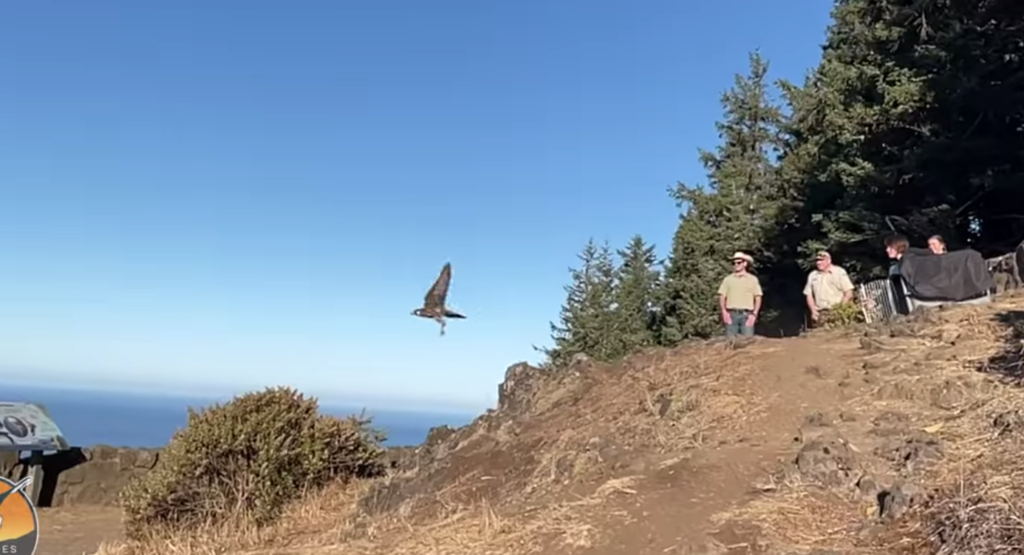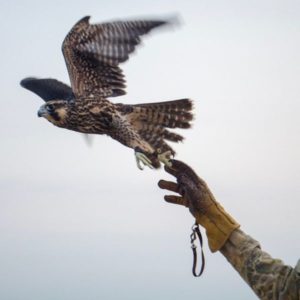
By DANA TIMS/YachatsNews.com
Tens of thousands of people, glued to a live-streamed video feed, watched in horror three months ago as one peregrine falcon chick after another fell from their nest on a rock face near Yaquina Head lighthouse just north of Newport.
But only falconer Dave Cherry saw all of what happened next as he guided the transformation of one of the birds from a starving, emaciated chick to the soaring, fast-flying athlete that was successfully released back into the wild last week at Cape Perpetua.
“My whole goal was to get that bird into good shape,” said Cherry, a falconer with 50 years’ experience. “They have really good instincts and I knew pretty quickly she was going to be just fine.”

Two of the other chicks that fell the same day back in June were found dead at the base of the rocks at Yaquina Head Outstanding Natural Area Interpretive Center. A third was unaccounted for.
They were imperiled in May when first their mother, then their father a few days later, abandoned the eyrie where birders have flocked for years to watch one generation after another of peregrine falcons hatch and fledge.
An administrative decision not to mount a rescue effort caused considerable controversy at the time, with wildlife biologists in charge of the effort ultimately deciding to let nature take its course. Subsequent live-streamed images of three of the chicks falling from the cliff elicited outrage from many.
On June 17, Jim Burke, animal care director at the Oregon Coast Aquarium, recovered the falcon that survived from the interpretive center parking area. It was thought to be about five weeks old and still too young to fly and hunt on its own.
Burke arranged to have the chick taken to Cascades Raptor Center in Eugene for rehabilitation.
“We treated her for emaciation and general weakness,” said Louise Shimmel, the center’s executive director. “She was really very weak at the time.”
Within two weeks, Shimmel’s crew, relying on their permit to care for the federally protected species, had gotten in touch with Cherry, a Lebanon resident who volunteered immediately to help.
“She was starving to death and extremely aggressive and afraid,” he said of his initial July 6 assessment of the young falcon. “She was definitely a little nasty and ill-tempered.”
One of his first decisions was to drop the name “Princess” given to the bird by Shimmel’s staff in Eugene.
“That’s more for a French poodle,” Cherry said. “I named her Lucky, as in just lucky out of four babies, she was the one who made it.”
From decades of experience, he knew the chick was old enough to be able to rely on its instincts to do what comes naturally — hunt other birds in flight.
“Peregrines are the fastest animal in the world,” Cherry said. “They can hit 250 mph when swooping down on prey. This particular bird just needed to develop the muscles to be able to do that.”

Starting slowly, he fed Lucky from a lure he’d toss out a few feet. As the falcon got more comfortable with him, he then used a drone to fly up to a height of about 10 feet. The drone dangled mainly pigeons – a favorite of peregrines – as the bird got better and better at identifying and retrieving food from increasingly higher elevations.
Cherry said he’s not sure there was a true “aha moment” in Lucky’s training regimen, but if there was, it was the day a red-tailed hawk tried to steal the scrap of food the peregrine was eating.
“She initially jumped off the food because she wasn’t willing to die for it,” he said, adding that peregrines are no match for hawks in close encounters. Where they excel is in using their speed to relentlessly harass and dive bomb far slower red-tails. “When she started swooping on the hawk, I knew she was just about ready to be released.”
That moment came the morning of Thursday, Sept. 16, when the re-christened Princess, now banded for future identification, flew out of a portable enclosure into the clear-blue skies atop Cape Perpetua. She passed overhead several times before disappearing out of sight.
Her release came 91 days after her fall down the cliff near Newport.
Cherry did not attend the release, but is satisfied with the outcome of his training efforts.
“I’m just happy the bird is back in the wild,” he said. “If she can make it a week, she’ll be fine.”

To see a Facebook video of the falcon release go here


